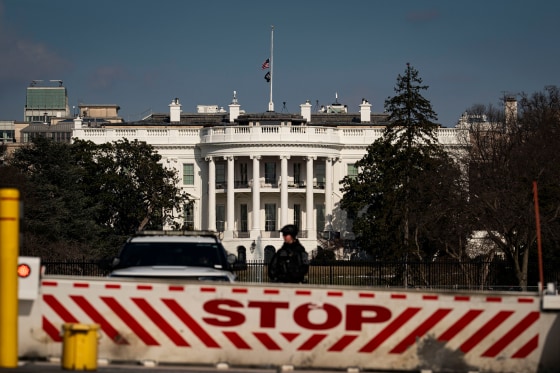
For the second time this week, a federal judge temporarily banned a federal aid money freeze ordered by the Trump administration on Friday, siding with a coalition of 22 states.
The broad mandate in the Office of Management and Budget memo that generated chaos and confusion this week in Washington and around the nation seemed to be illegal, according to the opinion of U.S. District Judge John J. McConnell in Rhode Island.
“The Executive s action unilaterally suspends the payment of federal funds to the States and others simply by choosing to do so,” the judge stated.
“The Executive cites no legal authority allowing it to do so; indeed, no federal law would authorize the Executive’s unilateral action here,” McConnell continued, approving the coalition’s request for a temporary restraining order.
Go here to watch live political coverage.
The Justice Department contended that since the White House letter announcing a broad block on the majority of government grants and loans was withdrawn Wednesday, two days after it was distributed to federal agencies, the matter is moot.
Following the revocation of the memo, White House press secretary Karoline Leavitt tweeted: “This is NOT a revocation of the federal funding freeze,” the court observed. The OMB memo is only being revoked. Why? to clear up any misunderstanding the court’s order may have caused. The President’s executive orders pertaining to government funds are still in full force and effect and will be strictly enforced.
According to McConnell, “the evidence shows that the alleged rescission of the OMB Directive was in name-only.”
The Court concludes that the policies in the OMB Directive that the States contest here are still in full force and effect, and as a result, the issues raised in the States TRO motion are not moot, he wrote, citing the Press Secretary’s unambiguous statement and the ongoing actions of Executive agencies.
Requests for response were not immediately answered by the Justice Department or the White House.
Federal agencies were instructed by the OMB memo issued Monday night to temporarily suspend all activities pertaining to the obligation or disbursement of all Federal financial assistance, as well as any other pertinent agency operations that might be implicated by the executive orders. These activities include, but are not limited to, financial assistance for foreign aid, nongovernmental organizations, DEI, woke gender ideology, and the green new deal.
According to the memo, the delay would give the administration time to assess which initiatives align with the goals of President Donald Trump. Though it was ambiguously written, making it unclear what aid would be stopped, it said that Social Security, Medicare, and direct payments to individuals should not be disrupted. Following its release, concerns surfaced of individuals and groups not being able to access the systems necessary to obtain their federal assistance.
Before it was revoked, the memo also sparked two lawsuits: one from a group of NGOs in Washington, D.C., and another from a coalition of states and the District of Columbia.
In order to allow for complete arguments on the administration’s directive the next week, U.S. District Judge Loren Ali Khan delayed it on Tuesday.
Going a step further, McConnell’s order concludes that the states “are likely to succeed on the merits of some, if not all, their claims.”
“Federal law specifies how the Executive should act if it believes that appropriations are inconsistent with the President s priorities it must ask Congress, not act unilaterally,” he stated.
Are there any elements of the pause that the Executive may be able to legally and constitutionally implement? The Court believes that there are, but it is also certain that there are several instances in the Executive Orders that are broad, comprehensive, and unclear pauses of vital financing that are not, according to his ruling. The scope and vagueness of the Executive’s conduct make it impossible for the Court to do otherwise, thus it must act at these early stages of the dispute under the worst-case scenario.
Until he makes a decision on a pending application for a preliminary injunction from the states, the judge’s temporary restraining order prevents the administration from permanently halting current federal financial aid to states.
Attorney General Peter Neronha of Rhode Island expressed gratitude to the judge “for seeing the irreparable harm that this directive would cause.”
Important federal funds that Congress has already allotted to the states and that Americans depend on cannot be intercepted by the Executive Branch. In a statement, he said that the directive “was implemented to inspire fear and chaos” and that it targets “public safety, health care, veterans services, childcare, disaster relief, and countless other cornerstones of American life.”
